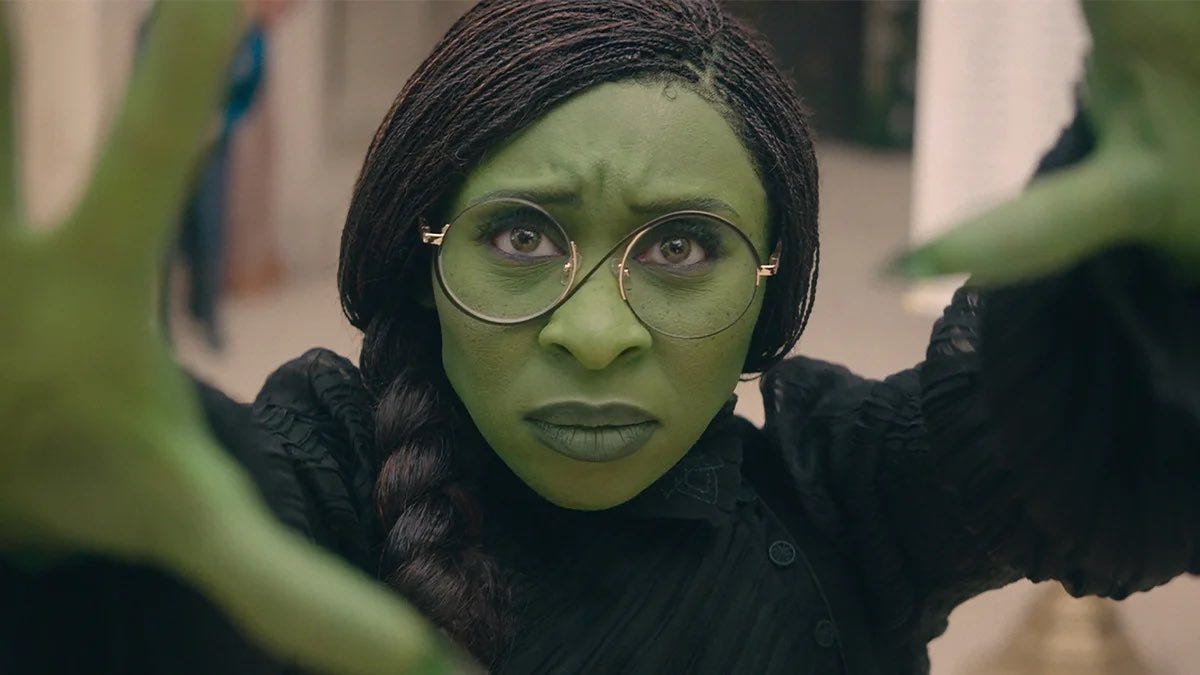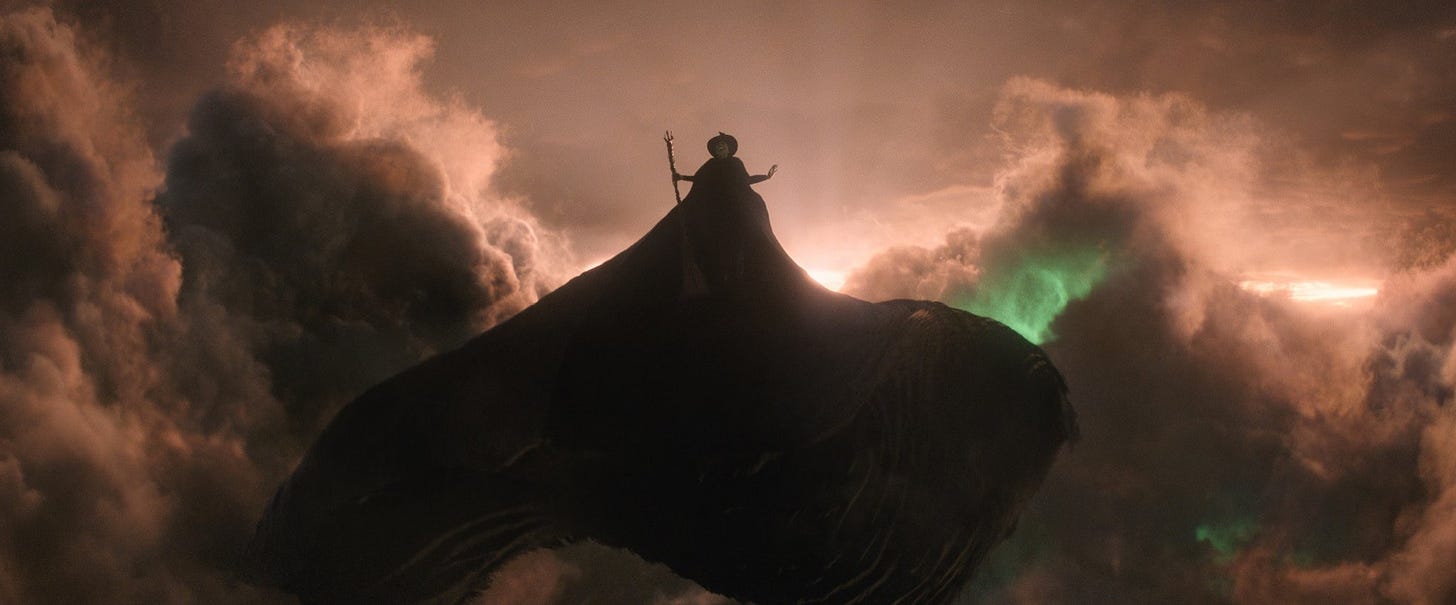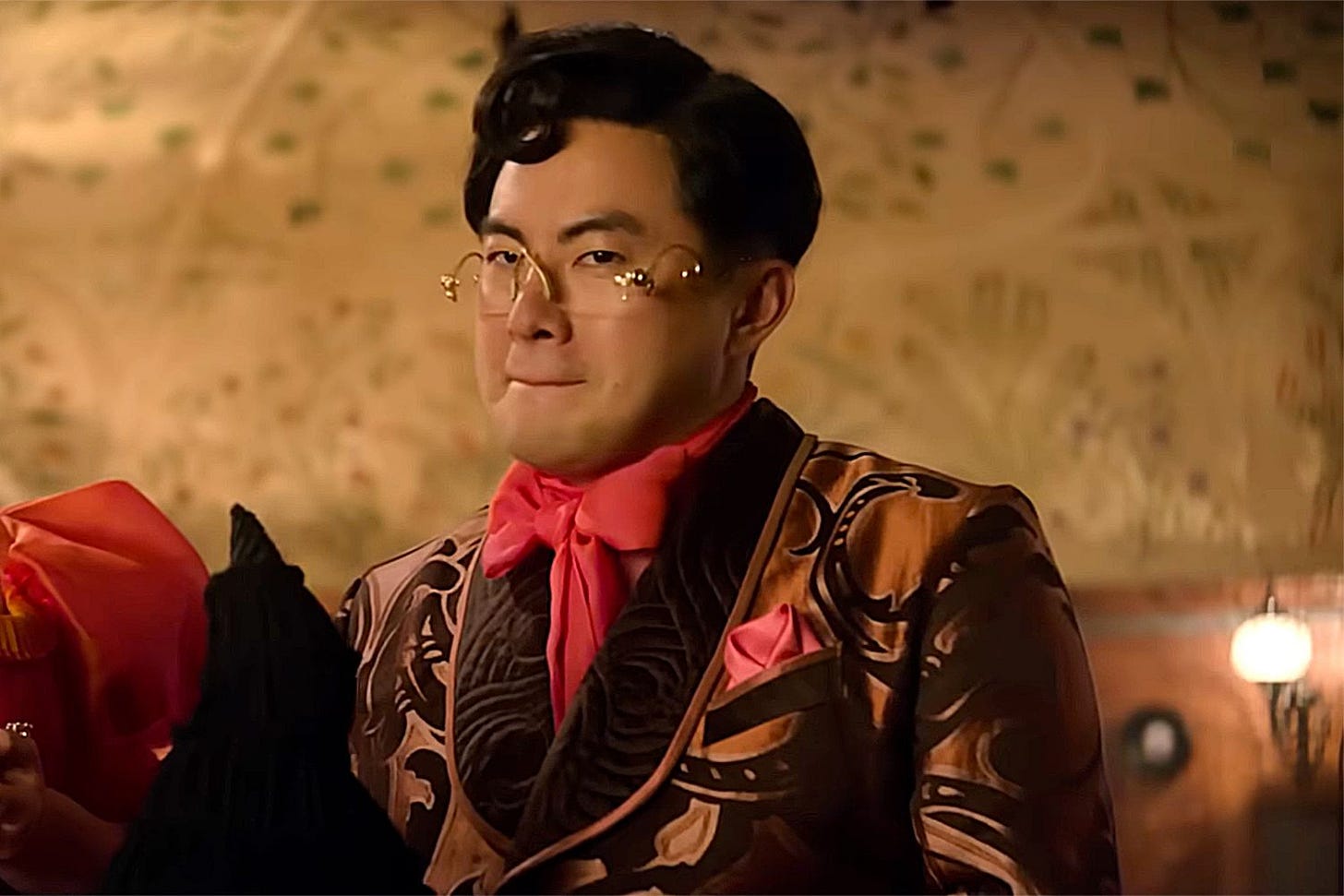I’ve now seen Wicked twice, and there’s so much I could talk about. I could talk about how each musical number is dynamically staged (I think “One Short Day” is my current fave, apart from “Defying Gravity” which we’ll get to). I could talk about how my decision to become an Arianator back in 2013 continues to pay off in dividends, how if Ariana Grande does become a Best Supporting Actress frontrunner this Oscar season I will be insufferable. I could talk about Jonathan Bailey’s endless charisma and what can only be described as bisexual dancing (if you’ve seen the movie you know!); and of course, I could talk about what a FORCE of nature Cynthia Erivo is as Elphaba, from her quieter, tearful moments to the powerful spell she casts during “Defying Gravity,” arguably the movie moment of the year and one that demands to be seen on the big screen.
Instead, I’ll try to talk about all these things and more as I break down a thought I had even before seeing the film for the first time: how excited I was to see this collection of actors on the big screen, to see them go from stars to Movie Stars.
And look, I’m well aware that movie stars as we’ve known them have been in steady decline. Will we have new Movie Stars like Julia Roberts, Denzel Washington, or Tom Cruise—stars that dominated the cultural landscape with their mega-watt charm and worldwide box office grosses—ever again? Probably not when it comes to the box office grosses (thanks streaming!), but if films like Barbie and now Wicked are any indication, movie stars are still all around us if you choose to seek them out.
Barbie and Wicked both did this wonderful thing where they not only cast big name talent, but also filled out the ensemble with talents we’ve known from either the stage or small screen, and gave them the Movie Star treatment. Sure, Barbie was fronted by Margot Robbie and Ryan Gosling, but then you had Insecure creator Issa Rae as President Barbie, Hari Nef as Dr. Barbie, and America Ferrera as Gloria—and let’s not forget that Ferrera’s Barbie run included a monologue that will go down in movie history, plus an Oscar nomination.
Wicked is opening similar doors for its cast. First there’s Grande, who—I know, I know—didn’t need to be in Wicked to be considered a bonafide superstar. While she got her start on Broadway and as a child actress before becoming one of the defining pop stars of her generation, Wicked is her proper introduction as a movie actress. And if you’re as obsessed as I am with pop stars making the leap to acting, you know it can be a tricky leap to make. It’s all about timing and talent and picking the right project that ensures you stick the landing. In my eyes and that of many others, Grande has done that; she had nothing to prove when it came to her singing, but the charisma, uniqueness, nerve, and talent she brings to her portrayal of Glinda solidifies her movie star potential. I can’t wait to see what she does with a role that requires no singing.
And then there’s Cynthis Erivo, whose moment in the sky is a long time coming. She’s most well-known for her Tony-winning role as Celie in the Broadway version of The Color Purple (seriously, watching her performance of “I’m Here” will change you for good), and while she had a supporting role in the underrated Widows and was Oscar-nominated for Harriet, Wicked feels like the beginning of Erivo’s mainstream ascent. Elphaba is an iconic role on its own, but the ways in which Erivo shapes the character to fit her talents—and her unique lived experience as a Black queer woman—feels singular. She holds your attention in every frame, whether she’s singing or not. It’s stunning work.
Erivo has additional queer back-up thanks to Jonathan Bailey and Bowen Yang, two openly gay actors familiar to many of us TV watchers. Bailey, of course, catapulted to fame in Bridgerton, but his best work is in the criminally underseen miniseries Fellow Travelers (ugh I need a rewatch!). As Winkie prince (will we learn what Winkies are in Part Two?) Fiyero, Bailey effortlessly slides into leading man status. His chemistry with both Erivo and Grande is dazzling and unique to each scene partner. But the distinct notes of charm and sensuality he brings with his many scene partners during the “Dancing Through Life” sequence—female, male, and otherwise—needs to be studied. Yang, the current MVP of SNL and co-collector of culture on Las Culturistas, has the smaller role of Glinda’s friend Pfannee, but he elevates the part with physical choices and line readings that stick with you. This isn’t Yang’s first film role—he co-starred in the rom-com Fire Island, a Hulu release that’s my favorite film of the 2020s so far—but it’s his first big screen moment. Wicked is hopefully just the beginning of many big screen moments to come for Yang.
And I guess that’s what I’ve been trying to get at, in my long-winded way: Wicked felt like the beginning of a movie star moment for many of its cast members before I even saw it, and that feeling’s been confirmed now that I’ve seen it. To borrow from Wicked’s colorful lingo, it was thrillifying to see so many talented people I know in different contexts get the chance to be big-screen, all-caps MOVIE STARS. I hope Grande, Erivo, Bailey, and Yang’s moment stretches beyond next year’s Wicked: Part Two, but I’m not naive to the workings of the Hollywood ecosystem. Grande and Bailey will likely get ample opportunities to build their resumes with starring roles; Erivo and Yang’s paths to sustained mainstream success are less certain thanks to an institution that sees anyone who isn’t white, passably straight, and cisgender in leading roles as a “risk.”
Of course, the splintered ways in which we all now enjoy pop culture has changed what it means to be a star. It’s wonderful when we can still have a monocultural moment that gives everyone the chance to fly, but it no longer remains the end-all, be-all of a long, successful career.
Perhaps that’s good news.
-Dustin









